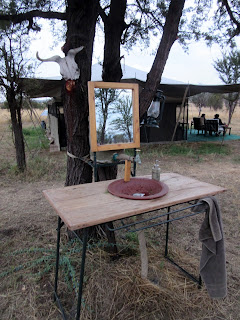And for the most part, the National Park Lodges and Permanent Tented Camps where we stayed were pretty self-sustaining. At the very least, they all used their own generators to supply electricity.
But I was especially impressed with the two seasonal camps where we stayed, Kati Kati Mobile in the Central Serengeti and the Serengeti North Wilderness Camp near the Kenya border. Seasonal camps are allocated for three to four month periods and no permanent structures are allowed. Once the camp moves out after the season, the areas are "rested" to recover until used again.
The whole idea of a mobile or seasonal camp is to make use of an area in a non-invasive, non-damaging way. Seasonal camps take their conservation practices to the next level offering Eco-friendly camping without sacrificing luxury.
While all operators are meant to work under certain guidelines, Serengeti North Wilderness Camp really seemed to embrace their Eco-friendly practices.
For instance, they use solar-charged LED lights, kerosene lamps and candles for lighting. Torches in the tents are of the wind-up type to save them from disposing of batteries. Their central charging station (for phones and cameras, etc.) in the lounge tent are also solar-powered. No noisy generators! (They do have a back-up generator if needed, but it is rarely used. Sometimes they use it to charge batteries if there is no sun for a few days.)
 |
| shower floor |
Since a tent in place for any length of time kills the grass under it, they try to mitigate this by using open-weave ground sheets in the shower and verandah areas and the floors in the dining and lounge tents.
 |
| Mr. Frog says "Thank you!" |
They use Eco-flush toilets which are emptied each day into a large central long drop at the back of the camp which is then correctly filled in when the camp is disassembled. They do not use any chemicals in their toilets, just plain scented water. Chemicals take ages to degrade.

They provide en-suite bucket showers which work very well. Get wet - turn off - wash - rinse off. And the water is nice and hot! They use biodegradable soaps and shampoos so the grey-water run-off does not damage the bush.
They provide hot water in thermoses and cold water in pitchers for washing in your tent and bottled water for drinking and they return the bottles to Arusha for recycling. They also return their "non-return" bottles to a great little business in Arusha called Sangha which recycles them into jewelry and art objects.
They cook and refrigerate using gas. All burnable waste is incinerated (vegetable peelings, etc.) and this also heats water for showers and washing. They use everything they can to heat water - even old lunch boxes - and this helps lessen their use of wood and charcoal. All non-burnable waste is removed for proper disposal outside of the park.
It is clear that the Serengeti North Wilderness Camp has put a lot of thought into their impact on the environment.
The Spirit of Safari lives on in the Serengeti!









No comments:
Post a Comment